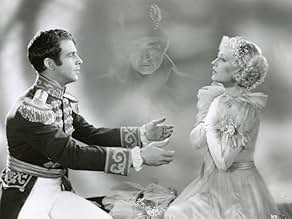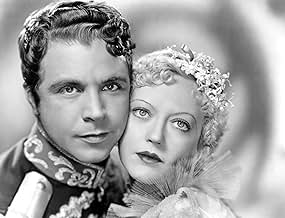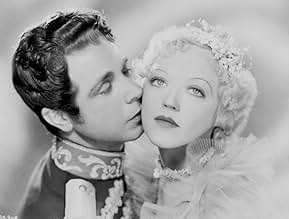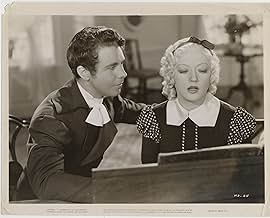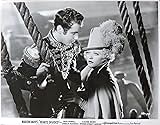Agrega una trama en tu idiomaNapoleon needs money to fight his wars in Europe so he wants 20 million dollars for the Louisiana Territory in the United States. To help the negotiations, he sends his brother, Jerome, to t... Leer todoNapoleon needs money to fight his wars in Europe so he wants 20 million dollars for the Louisiana Territory in the United States. To help the negotiations, he sends his brother, Jerome, to the U.S. on a goodwill tour. At a Maryland Horse Track, Jerome shows up without notice and ... Leer todoNapoleon needs money to fight his wars in Europe so he wants 20 million dollars for the Louisiana Territory in the United States. To help the negotiations, he sends his brother, Jerome, to the U.S. on a goodwill tour. At a Maryland Horse Track, Jerome shows up without notice and soon wins an afternoon tour with Betsy. He falls for her, but she will have little to do w... Leer todo
- Dirección
- Guionistas
- Elenco
- Henry
- (as Charlie Ruggles)
- Pippin
- (as Phillip Hurlic)
- Gabriel
- (sin créditos)
- Robert Livingston
- (sin créditos)
- Dirección
- Guionistas
- Todo el elenco y el equipo
- Producción, taquilla y más en IMDbPro
Opiniones destacadas
From the start, I must admit that for me, at least, the film has a major strike against it. The likable Dick Powell co-stars in the film, however, since it was made during his "singing star" period, he spends lots and lots of time singing...and I don't particularly like it in the film. In fact, Powell himself hated all the singing roles he had through the 1930s and loved when they gave him films where he could concentrate on his acting--which was usually very nice. Why they would have Davies starring opposite a singer like Powell is beyond me--it does not play to her strengths--she was certainly NOT a singer but was more adept at light comedy. Now had the female lead been Jeanette MacDonald, this might have worked better! As for the rest of the cast, Davies got some nice support. Likable and very capable supporting actors like Henry Stephenson, Arthur Treacher (oddly, he's NOT starring as a butler here), Claude Rains, Charlie Ruggles and Edward Everett Horton are on hand--adding a lot of nice color to the film.
Oh, and speaking of color, some might feel rightly put off by the slaves in the film. They are pretty happy folks and the white masters are pretty good to them (especially the sweet Davies) and this is pretty tacky. This "happy slave" stereotype is perhaps worse than just ignoring the plight of blacks during the era in which the film was set.
The setting for the film, incidentally, is both in France and the US during the early years at the beginning of the 19th century. Napoleon (Rains) need funds for his many wars and is trying to sell the Louisiana Territory to the Americans. During these negotiations, a French agent and brother to Napoleon (Powell) is in the States--though you really aren't sure why. In his capacity as an agent, he wants to remain incognito, so he poses as a French language teacher and is engaged by Davies' family to tutor her. Her family is quite wealthy--and happen to hate Napoleon.
Naturally, like romances of the day, you know that eventually the two will be in love. However, where it went from there was hard to predict because, amazingly, this weird and seemingly silly plot is actually based on the real life romance between Elizabeth Patterson and Jerome Bonaparte! And, oddly for a romance of the 1930s, it ends most tragically--not sweetly like the audience probably hoped.
So how true is this film? Well, in many ways it's surprisingly close--at least in the first 2/3 of the film. However, the scene with Napoleon convincing Elizabeth to give him up never occurred--as in real life, she tried and tried in vain to keep her Jerome--even though history shows us that he wasn't worth this loyalty (he was a real chuckle-head). I also cringed a bit with the scene between Napoleon and his mommy--it just came off as false and a bit silly. But worst of all was the tacked on happy ending--that never happened in real life!! In reality, Jerome left his pregnant wife and married a German princess!! Oops! This bit of historical liberty is simply unforgivable. How so many people could give this amiable but patently false film a 10 is beyond me.
The cast was wonderful, the script was meaty for a romantic picture, with some really funny lines, and I enjoyed the sweet romance between the principals, Miss Davies and Dick Powell. Claude Rains was a joy to watch as Napoleon; loved that bathtub scene with his servants scrubbing his manly hairless chest. Sort of like Johnny Rocco (Edward G. Robinson) in "Key Largo", but much funnier.
Special mention goes to character actors Charlie Ruggles, Arthur Treacher, and Edward Everett Horton as would be suitors to Miss Davies; they helped round out the script and bring even more giggles to the story.
I also enjoyed the music, including two pretty tunes by songmeister Harry Warren, and the negro spirituals.
8 out of 10.
This film is typical of Marion Davies for it not only has the ability to show off benefactor William Randolph Hearst's many historical items and costumes, she is able to show her natural spunk and joviality. Powell responds in kind with his lighthearted cracks and beautiful smile. The two work well together and shine in their own rights.
There are also a few catchy songs sung by the gorgeous tenor voice of Dick Powell.
Set during the early 1800s, Napoleon Bonaparte (Claude Rains) assigns his younger brother, Jerome (Dick Powell) to America as representative for the negotiation for the sale of the state of Louisiana for $20,000. Taking up residence at the Baltimore Inn, Jerome, on his resented "good will tour," comes to the horse races where he becomes enamored by the presence of Betsy Patterson (Marion Davies), a society girl. At first Betsy resents this young man until he croons to her, later assuming the role in the guise as her singing tutor. His identity is finally realized at a reception of the Patterson home where Jerome publicly proposes to Betsy, regardless of his telegram from Napoleon, now Emperor of France, ordering his return to marry Princess Catherine of Wurtemberg or face disgrace as a traitor.
Often categorized as a musical, songs for this production are limited to some degree. While HEARTS DIVIDED might have selected popular songs from the colonial era, an original score by Harry Warren and Al Dubin was used instead. New songs include: "My Kingdom for a Kiss" (sung in French by Dick Powell); "Nobody Knows the Trouble I Have Seen" (traditional Negro folk song performed briefly by The Hall Johnson Choir); "My Kingdon For a Kiss" (reprized in French and English by Powell); "Two Lovely Heart's Divided." and "My Kingdom For a Kiss." "My Kingdom for a Kiss," a nice tune, is underscored numerous times, used effectively during scenes involving Davies and Powell.
Although Marion Davies is far better suited for comedies than dramas, she makes a lovely presence in this costumer. It's seems unlikely, however, finding resident crooner Dick Powell in early American setting, even more unlikely having him playing a Frenchman. While he does sing a song entirely in French, Powell, along with Rains, make no attempt speaking with French accents. Overall, the Davies and Powell combination, which began with the hit and miss comedy of PAGE MISS GLORY (1935), would come to its conclusion with this historical account and based on fact love story.
Edward Everett Horton, Charles Ruggles and Arthur Treacher provide amusing moments with their comical support as members of the United States senate and would-be suitors of Glorious Betsy. Straightforward performances go to Henry Stephenson as Betsy's father; Clara Blandick as Betsy's spinster aunt; and Beulah Bondi with only one scene as Bonaparte's mother. Hobart Cavanaugh, Walter Kingsford, Etienne Girardot and Philip Hurlic can be seen in smaller roles.
Regardless of his British heritage, Claude Rains physically makes a fine Napoleon, a role enacted in more detail by Charles Boyer in CONQUEST (MGM, 1937), earning the born Frenchman an Academy Award nomination. No such honor for Rains here, but although his scenes are somewhat limited, he makes every moment count, especially later in the story where, in the manner of a mother coming between her son and future bride, asking Betsy, for the good of France, to give up his brother, but it is Davies as Betsy, under Borzage's sensitive direction, who nearly overcomes Rains performance in how she handles this situation.
Reportedly previewed at 88 minutes, circulating prints for available at 76 minutes, making one hope for the discovery of the missing footage. A rarely seen item from the era of Warner Brothers musicals or costume dramas, HEARTS DIVIDED can be seen periodically on Turner Classic Movies. (***)
¿Sabías que…?
- TriviaThere is an outtake of actor Claude Rains, dressed as Napoleon, crying out, "God damn!" taken from this film.
- Citas
Napoleon Bonaparte: Every time you open your mouth the British Navy comes sailing out.
- ConexionesReferenced in Svengoolie: The Invisible Man (2008)
- Bandas sonorasLa Marseillaise
(1792) (uncredited)
Written by Claude Joseph Rouget de Lisle
Played and sung early in the picture
Selecciones populares
Detalles
- Tiempo de ejecución1 hora 27 minutos
- Color
- Mezcla de sonido
- Relación de aspecto
- 1.37 : 1
Contribuir a esta página


